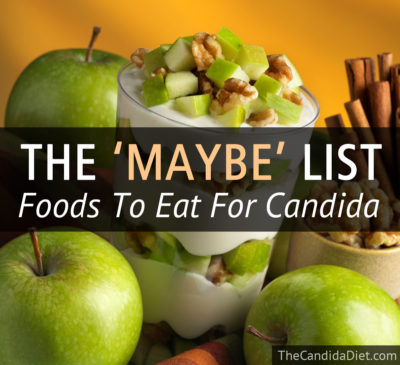The ‘Maybe’ List Of Foods To Eat

The food lists that we have included in the Ultimate Candida diet program are arranged into YES, NO, and MAYBE lists. This website contains shortened versions of those lists. You can find the list of foods to eat here and the list of foods to avoid here.
The MAYBE list contains those foods that are OK for many people, but which can still be a little risky for other Candida sufferers.
Examples are beans, low sugar fruits, and starchy vegetables. At the beginning of your Candida diet, you might choose to include one or two of these foods. As your diet progresses and you start to reintroduce foods, this list is a useful place to start.
With all the ‘maybe’ foods, the key is to start off with small portions and see what they do to your Candida symptoms. If you find that one food in particular is causing problems, it will be easy to recognize. Once you start adding some foods back you will find the Candida Diet much easier to follow, although you should never go back to the high sugar diet that you were probably indulging in before.
Table Of Contents
The MAYBE List
Here is a table of the ‘maybe’ foods. These can be eaten in small amounts at the start of the program, and in larger amounts as you begin to recover.
| CATEGORY | FOODS TO EAT |
|---|---|
| VEGETABLES | Beans Beets Carrots Corn (non-GMO) Peas Potatoes Pumpkin Yams |
| FRUITS | Apples Apricots Blackberries Blueberries Grapefruit Oranges Peach Pears Strawberries Watermelon |
| GRAINS & PSEUDO-GRAINS | Amaranth Black rice Brown rice Oats Wild rice |
| RED MEATS | Beef Lamb Venison |
| NUTS | Nut milks Nut butters Peanuts Pistachios Walnuts |
| FERMENTED FOODS | Kombucha Kvass |
| DRINKS | Coffee Decaf coffee Black tea Green tea Vegetable juice |
Vegetables
These include the more starchy vegetables like carrots, beans, and potatoes. These should be minimized or eliminated from your diet at first, but can be included in small amounts as you progress through your treatment.
Fruits
These fruits have low glycemic loads and are much less likely to spike your blood sugar than foods like bananas or grapes. Keep in mind that they should still be minimized or eliminated from your diet in the early stages of treatment.
Grains And Pseudo-Grains
These grains and pseudo-grains are less likely to irritate the gut than glutenous grains like wheat or rye. Small amounts are OK but you would be better off sticking with options like millet or buckwheat, at least to start.
Red Meats
Red meats aren’t digested very well, and tend to raise the environmental pH in your intestines. Stick to white meats as much as possible.
Nuts and Seeds
Nut milks and butters tend to be more problematic than the nuts themselves. Making your own is the best way, but if you can’t do that then make sure that you buy a reputable organic brand.
Fermented Foods
Foods like kefir and sauerkraut tend to be most beneficial for gut health. Kombucha and kvass tend to be much higher in sugars, and so less beneficial for Candida sufferers, but it depends on how they are made.
Drinks
You should aim to greatly reduce your caffeine intake, especially if you’ve been overdoing it. There are other options if that’s proving impossible for you. Decaf coffee still contains small amounts of caffeine, but look for decaf that is made by the Swiss water process. Green tea is also lower in caffeine than coffee or black tea, and has other health benefits too.
If you’re looking for more detail on how to plan and prepare meals during your Candida diet, check out my Ultimate Candida Diet treatment plan.

3-Month Candida Elimination Kit Start Your 3-month Candida Cleanse
This Candida Kit contains all the supplements recommended on the Candida Diet:
- LIVER ONE to process and remove the toxins created by Candida.
- CANDASSIST to inhibit and weaken the Candida colonies in your gut.
- PROBIOTIC to replace the Candida yeast with probiotic bacteria.
Plus... the CANDIDA DIET RECIPE BOOK with 50+ low-sugar recipes


Leave a Reply